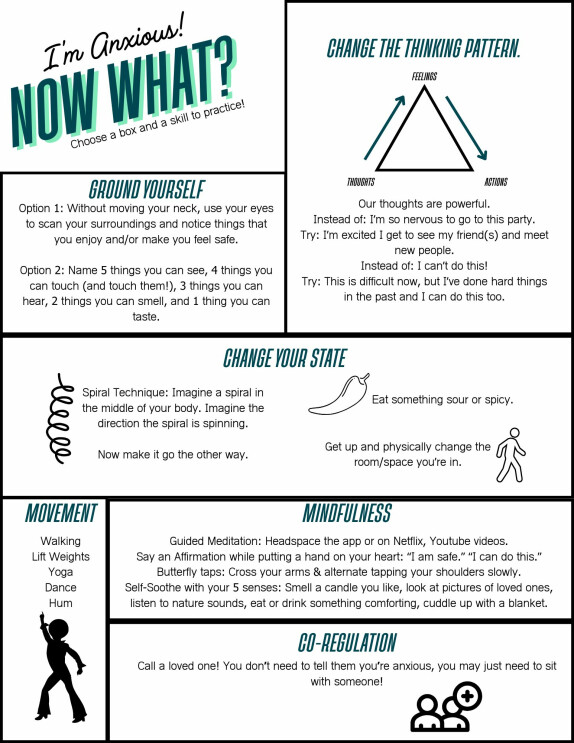Contact US
Address
Peace Lutheran Church
1900 E. Lincoln Highway
New Lenox, IL 60451
MAP IT
Phone
(815) 485-5327
(815) 485-2688 Fax

Peace Lutheran Church
1900 E. Lincoln Highway
New Lenox, IL 60451
MAP IT
(815) 485-5327
(815) 485-2688 Fax
 Adult Education Hour
Adult Education Hour
Sunday Adult Education Classes Coming Up:
Please join us on most Sundays for our Adult Class at 9:55am starting September 7th.
Mental Health Resources from Karissa Fleming's Presentations
May is Mental Health Awareness month.
Karissa Fleming offered us a 4 week reflection on Mental Health.
Week 1: What if it Goes Right?
Our thoughts are a powerful component to our mental health. Oftentimes, we can get stuck in a loop of negative thinking patterns and worrying about everything that can go wrong. Eventually, this loop can become rumination (thinking about the same negative thing over and over and over again). Fun fact, our thoughts directly influence our feelings which directly influence our actions. If our thinking is stuck in a negative loop, it's logical to see how our actions aren't aligning with our values nor desires.
We invite you to try this journaling exercise to shift perspectives!
On a blank piece of paper write the words "What if it goes right?" Below that, explicitly write down what you're nervous about for the day and write the best possible outcome. An example: I'm nervous about a meeting at work. I'll write, "The meeting at work goes by quick and without any hiccups! I don't get nervous and my boss likes my presentation."
Why this works: In the same way we are setting ourselves up for a negative experience through rumination, we are now asking ourselves to look out for signs of success. Rather than setting off internal alarm bells for anxiety, we are reminding ourselves that we are safe and that good is possible.
Happy Journaling!
Week 2: IMPROVE
One of the most trusted forms of therapy is called Dialectical Behavioral Therapy (DBT). The history behind DBT is fascinating. It was created by Marsha Linehan after experiencing years of emotional turmoil and institutionalizations. Linehan went on to become one of America's most prized psychologists and creator of DBT--creating a modality of therapy that provided everything she felt was missing from her journey! A major part of DBT is distress tolerance. Let's learn one of her skills (as told through acronyms, a theme in the DBT world) to help IMPROVE a distressing moment.
I: Imagery. Engage all of your senses and imagine a calm/safe place. What sounds can you hear? A bubbling brook? Any sensations? Like a warm sun. Or even expand on last week's skill and imagine the event you are stressed about going well!
M: Meaning. Is there any meaning to be made in this moment? How can this stressful moment be used later? What lessons or strengths can you identify from this moment?
P: Prayer. Use prayer to accept the difficulties of what you can't control, to seek guidance, or lament.
R: Relaxation. When we can relax the body, the mind follows. This is a perfect time to engage in deep breathing, stretching, or progressive muscle relaxation.
O: One thing in the moment. Take a break from the stress and complete a simple or repetitive task that requires your full engagement. Do the dishes, count backwards from 100, or any other task. Fun fact, when you complete the task your brain will reward you with Dopamine (a happy hormone!).
V: Vacation. Allow yourself to take a short break. The distance will help you see a grander scale. Furthermore, the break may provide you with dopamine or endorphins to help boost mood! This break can be anything. A few suggestions are: a mindful walk where you notice the nature around you, reading something that interests you, or catching up with a friend.
E: Encouragement. Remind yourself that you are capable of overcoming this distress. A few mantras to try, "I've done hard things before, I can do this too," and "It won't feel this way forever."
Week 3: Dance it Out
The human body is a fascinating and complex organism. We were created for movement and expression. When we feel distressing emotions our body's natural response is to shake (ever been to a scary movie and your hands were shaking? Or had so much anxiety you couldn't stop your teeth from chattering? This is a natural bodily response!). In an effort to boost happy hormones in our brain while regulating our nervous system, dance it out! Shake, shimmy, and move!
If it's good enough for King David (see 2 Samuel 6:14), then it's good enough for us!
Week 4: Community
Humans were never meant to live a life of solitude. Our very beings crave connection. For the final week of Mental Health Awareness, we invite you to find a community. The very presence of another individual can be calming (a concept known as co-regulation). When we share our joys and our burdens with other individuals, research shows that our mental health improves. In The Grieving Body by Mary-Frances O'Connor notes that after a death, bereaved individuals who isolate are at higher risk for illness. Join a book club, running club, Dungeons and Dragons campaign, or a sewing circle. Attend a gym class or come join us for worship!
You are not alone.

